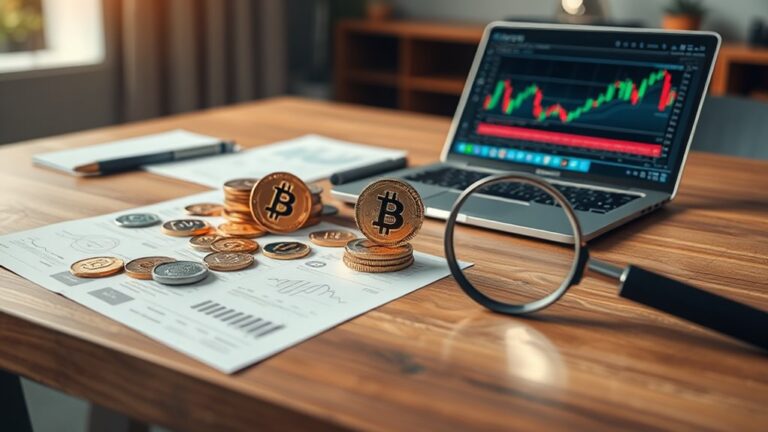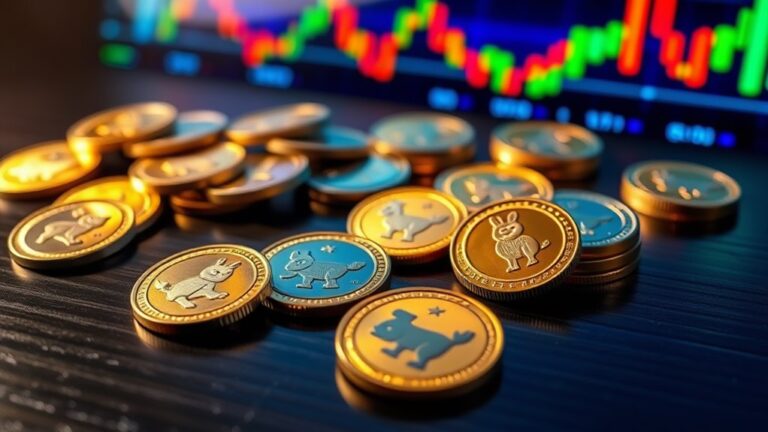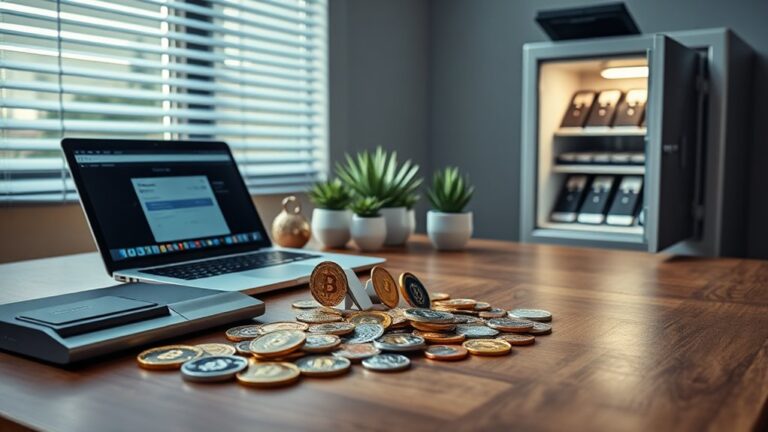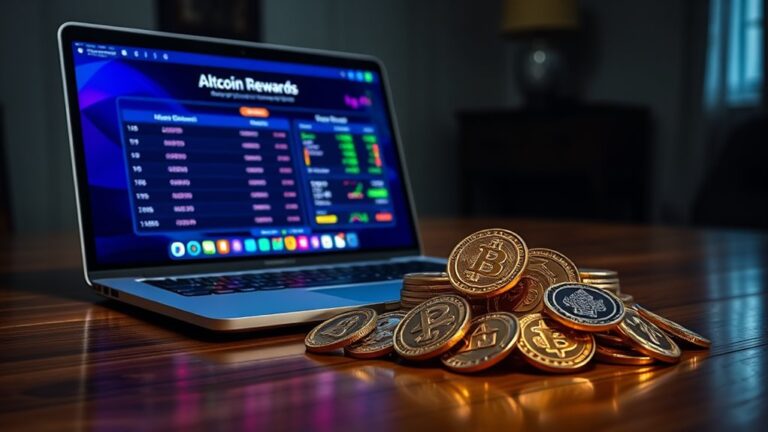
What Are Altcoins: An Essential Guide to Cryptocurrency Alternatives
Altcoins, or alternative coins, refer to digital currencies that exist alongside Bitcoin. They offer solutions to Bitcoin's limitations and include over 5,000 variations today. Altcoins can be categorized into types like stablecoins, utility tokens, and privacy coins. Notable examples include Ethereum and Cardano, each with unique features. While altcoins present various use cases and investment opportunities, they also involve market risks and volatility. Understanding these dynamics is essential for anyone interested in the cryptocurrency landscape. Further information can enhance comprehension of this evolving topic.
Key Takeaways
- Altcoins, short for alternative coins, are digital currencies that supplement Bitcoin by addressing its limitations and offering unique features.
- There are over 5,000 altcoins, including types like stablecoins, utility tokens, and privacy coins, each serving distinct roles within the cryptocurrency ecosystem.
- Notable examples of altcoins include Ethereum, known for smart contracts, and Solana, recognized for high transaction speeds and low fees.
- Altcoins facilitate various use cases, such as payments, decentralized finance (DeFi), and gaming applications, broadening the scope of cryptocurrency applications.
- Market dynamics, including volatility and regulatory pressures, significantly influence altcoin values and investment considerations.
Definition and Proliferation of Altcoins
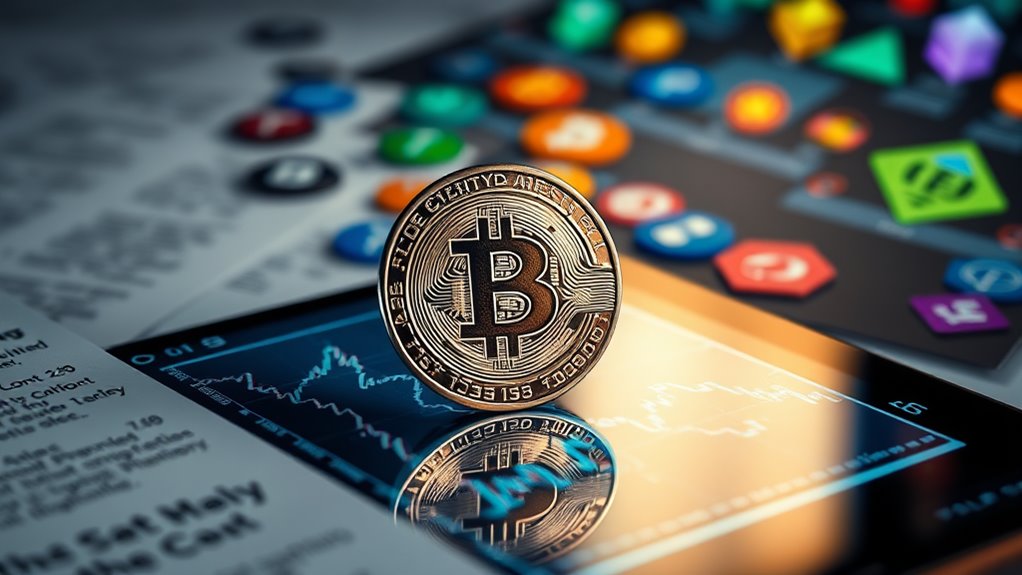
Altcoins serve as a significant category of digital currency that exists alongside Bitcoin, designed to provide alternatives that address various limitations of the original cryptocurrency. The term "altcoin," a blend of "alternative" and "coin," encompasses numerous cryptocurrencies beyond Bitcoin, although sometimes it may exclude Ethereum.
The first altcoin, Namecoin, emerged in 2011, marking the beginning of a growing ecosystem that now includes over 5,000 altcoins. Most of these cryptocurrencies build upon Bitcoin's framework but introduce innovative features and enhancements.
They utilize diverse blockchain technologies and consensus mechanisms, offering distinct advantages such as reduced transaction costs and improved speeds. As technology evolves, the proliferation of altcoins highlights their expanding role within the cryptocurrency market. Emerging technological innovations are driving the development of next-generation altcoins that enhance their utility and mainstream acceptance.
Types of Altcoins and Their Unique Features
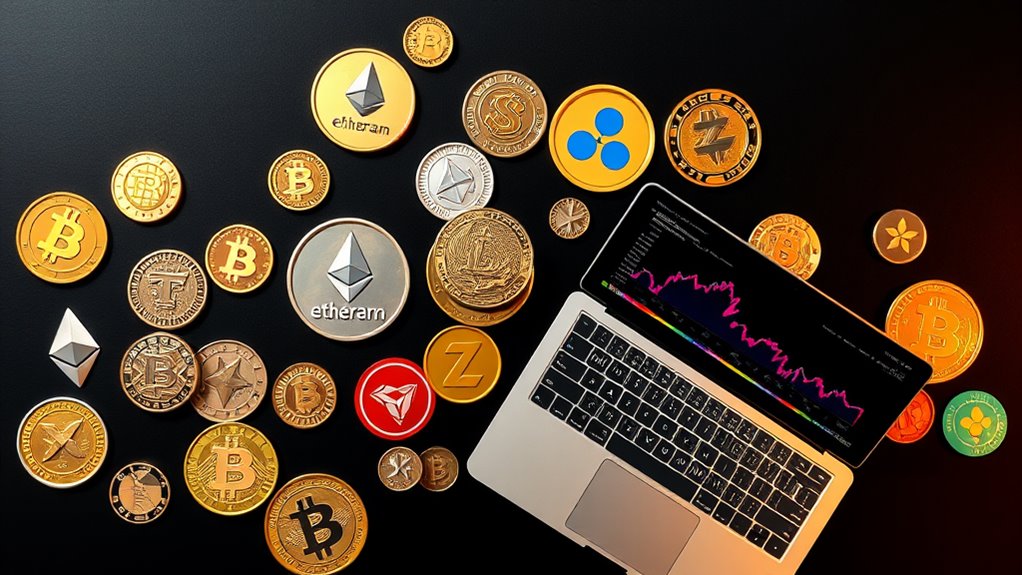
Various types of altcoins contribute to the cryptocurrency landscape, each offering unique features and purposes that cater to different needs within the market. The primary categories include stablecoins, which maintain a steady value; mining-based altcoins, which require computational power for transaction verification; utility tokens, serving specific roles in ecosystems; security tokens, representing ownership in real-world assets; and privacy or meme coins, known for their community-driven appeal. It's important to understand how coins operate on their own blockchains while tokens usually rely on existing platforms to function, as this distinction can influence their use cases and investment viability.
| Type of Altcoin | Features |
|---|---|
| Stablecoins | Pegged to assets for value stability |
| Mining-Based Altcoins | Relies on solving equations for creation |
| Utility Tokens | Functional within blockchain networks |
| Security Tokens | Represents investment in real assets |
| Privacy/Meme Coins | Focuses on anonymity or community support |
Key Examples of Notable Altcoins
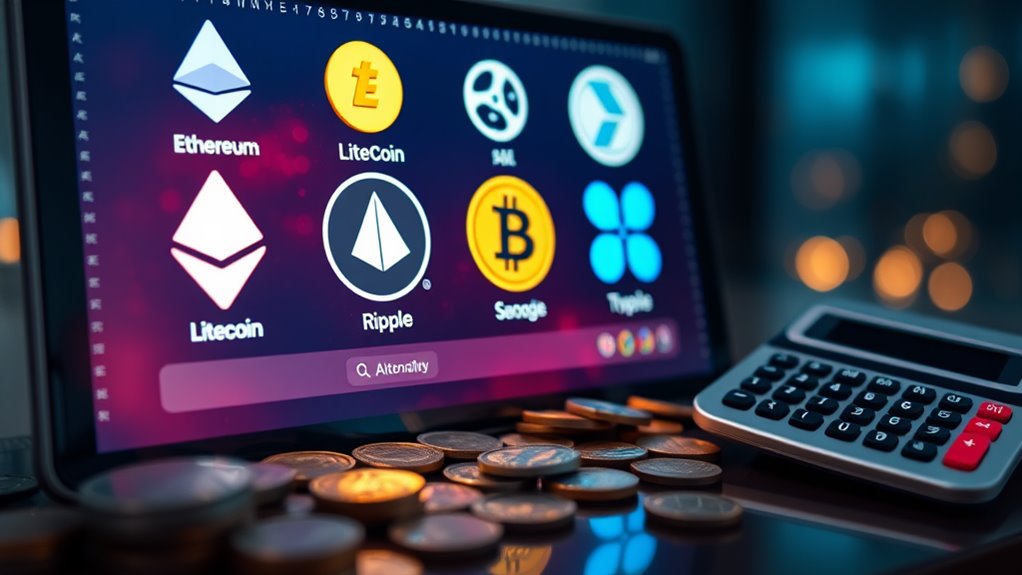
Key examples include:
- Ethereum (ETH): Renowned for its smart contract capabilities, supporting decentralized applications (dApps).
- Solana (SOL): Distinguished by high transaction speeds and low fees, ideal for dApps and DeFi projects.
- Cardano (ADA): Emphasizes security and sustainability through a research-driven approach to smart contracts.
In addition, Ethereum's transition to proof-of-stake has significantly enhanced network efficiency and reduced energy consumption.
These altcoins illustrate the diversity within the cryptocurrency ecosystem, showcasing potential applications beyond simple transactions.
As the market evolves, understanding these key players remains essential for those interested in exploring alternatives to Bitcoin and steering through the complexities of digital finance.
Functions and Use Cases of Altcoins
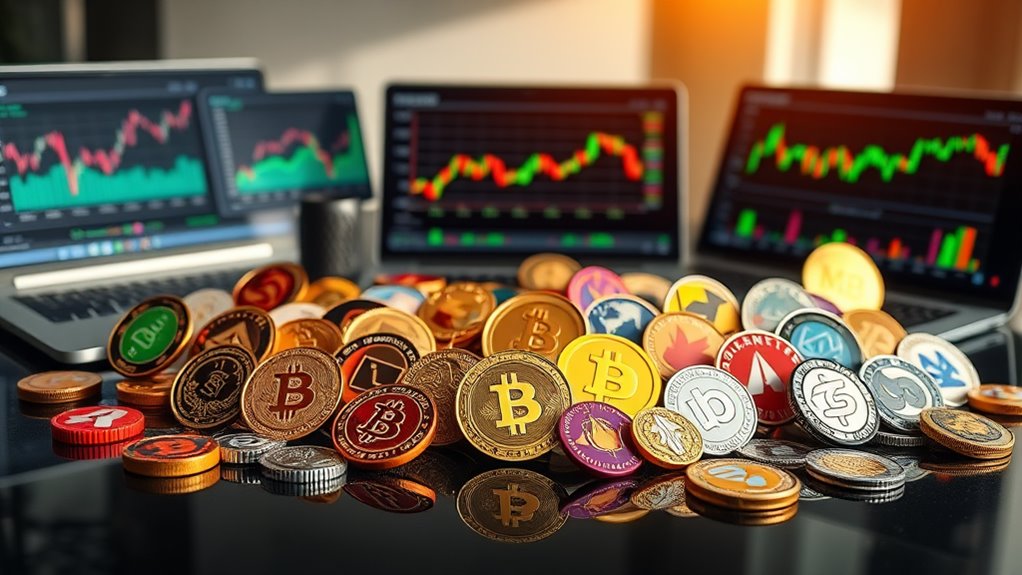
While many people associate cryptocurrencies primarily with Bitcoin, a range of altcoins is available, each serving unique functions and use cases in the digital economy.
Payment tokens act as a medium of exchange, while stablecoins provide price stability by being pegged to fiat currencies. Utility tokens enable user access to particular blockchain services, and security tokens represent ownership in assets.
Certain altcoins facilitate decentralized finance (DeFi), allowing for transactions without intermediaries. They also enable fast, inexpensive cross-border payments, microtransactions, and tokenized asset trading. Additionally, these altcoins may be utilized for community building, enhancing user engagement and collaboration within their ecosystems.
Additionally, altcoins are finding traction in gaming, where they support in-game purchases and play-to-earn models, all of which illustrate their adaptability and potential within various sectors.
Market Dynamics, Risks, and Investment Considerations
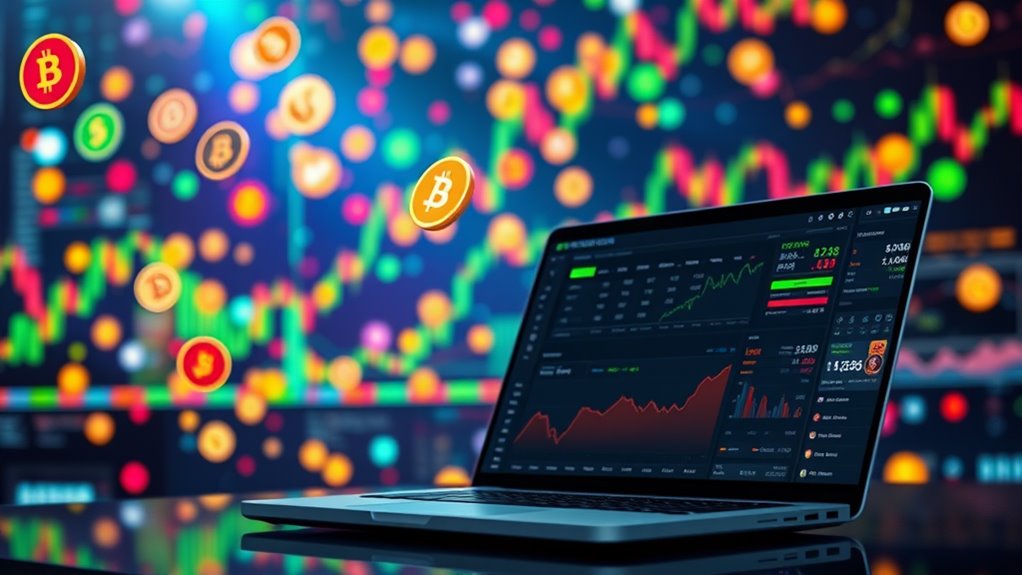
Understanding market dynamics, risks, and investment factors is essential for anyone interested in altcoins. Investors must recognize how altcoins behave in relation to Bitcoin, as market sentiment heavily influences their value.
Market dynamics and investor sentiment are crucial for understanding altcoin behavior in relation to Bitcoin.
Key elements to take into account include:
- Market Volatility: Altcoin values can fluctuate considerably, often mirroring Bitcoin's price movements.
- Regulatory Pressures: Changing regulations can impact the legitimacy and popularity of altcoins, which may deter potential investors.
- Diversification Importance: Investing in a variety of altcoins can help spread risk, particularly since many have varying degrees of utility and stability. Additionally, understanding the regulatory uncertainties associated with altcoins is crucial for informed investment decisions.
Frequently Asked Questions
How Do I Store Altcoins Securely?
To store altcoins securely, one must consider various methods: hardware wallets offer robust protection; software wallets require strong passwords and updates; while paper and encrypted backups guarantee recovery. Awareness of scams enhances overall security strategies.
Are Altcoins Legal in My Country?
Determining the legality of altcoins varies by jurisdiction. Over 119 countries permit them, while others impose restrictions or bans. It is crucial to consult local laws for clarity on cryptocurrency's legal status and regulations.
Can I Mine Altcoins Like Bitcoin?
One might explore the possibility of mining alternative currencies similar to Bitcoin. Various altcoins offer unique mining opportunities, often requiring different hardware and algorithms, presenting an accessible yet fluctuating venture for prospective miners.
What Is the Best Way to Trade Altcoins?
The best way to trade altcoins involves employing diverse strategies like scalping, trend following, and news-based trading. Successful traders also utilize technical and fundamental analysis while emphasizing risk management to navigate market volatility effectively.
How Can I Track Altcoin Prices Effectively?
To track altcoin prices effectively, one should utilize reliable platforms like CoinMarketCap and CoinGecko for real-time updates, and consider integrating APIs for enhanced functionality, ensuring accurate data for informed trading decisions and market analysis.
Conclusion
In conclusion, altcoins serve as a diverse garden within the cryptocurrency ecosystem, offering a variety of options beyond Bitcoin. Each altcoin carries its own unique features and use cases, appealing to different needs and interests. However, investors must navigate the market's complexities and inherent risks, much like a gardener tending to both fruitful plants and weeds. Understanding these dynamics is essential for making informed decisions in this rapidly evolving landscape of digital currencies.



